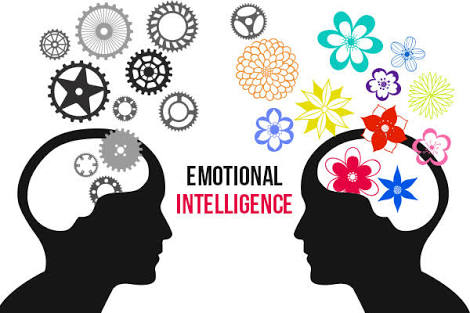How to nourish emotional intelligence

The traditional idea of intelligence as general capability to predict success is being questioned today. As an alternative, a more complete explanation has emerged emotional intelligence. Feelings, emotions, motivation, and social interaction have, in practice, more relationship with success and failure than pure intelligence.
Daniel Goleman, in his book emotional intelligence (1995), broke the traditional pattern on the authority of intelligence quotient (IQ). Without diminishing the importance of cognitive and intellectual tasks, Goleman considers them insufficient and suggests the following components of emotional intelligence. Without these components, the greatest talent would become useless :
.jpg)
- Ability to motivate ourselves, which allows us to carry out any important task.
- Perseverance to achieve our goals, without which even those with the highest natural intelligence would abandon their tasks.
- Impulse control in order to prevent undesirable behaviours that may be contrary to one's principles or inappropriate to the occasion.
- Ability to postpone rewards, a trait found in truly mature individuals who can make the necessary effort even though the reward may be delayed.
- Self-regulation of mood, useful to Escape from discouragement, irritability, jealousy, impulse, of revenge, despair, and many other moods that adversely affect physical and mental health.
- Emphathic ability, very useful to achieve optimal relation with others and, in the end, to reach success.
- Ability to trust, a basic trait to obtain tranquility, safety and satisfaction.
- The use of reason in intense emotional moments, absolutely essential to avoid the excessive influence of emotions.
HOW TO NOURISH EMOTIONAL INTELLIGENCE
Unlike conventional intelligence, which possesses a strong innate component, emotional intelligence is susceptible to great changes and improvements. The following are tips that cover the different areas for the development of emotional intelligence. Try them and observe whether they cause changes in your life.
- Know your emotions. You need to start observing your emotions. How do you feel, what type of thoughts go through your mind, how do you feel, what type of thought go through your mind, how do various event affect you? Write down in a note book the feelings and emotions you experience: upset, nervous, mistrusting, self-assured, apprehensive, generous, etc. Write down their duration and the internal and external experiences that make changes possible..
- learn to control your emotions. Flee from sorrow and make the decision to improve your mood. If you become anxious about the future, learn to change your thinking theme or do something to distract yourself. If you tend to lose your temper, practice ways to speak in a calm manner, breathe deeply and think of something funny. If these things do not work, get out for a moment, to allow the situation to cool down, and return once you are calmed down. If you feel inferior, think of your achievements and your strengths. Whenever you are irritated, encourage yourself and the solution will come.
- Practice self-motivation. Lack of motivation freezes situation. The lack of an attractive aim or goal disorients and depressive thoughts. Practice self-confidence and perseverance. Cultivate the delight for simple and ordinary things. Learn to enjoy what may not be attractive in the beginning, especially if it is something you must go through. Exercise discipline. Be realistic in your expectations; do not set up goals that are too ambitious or not ambitious enough.
- Identify other people's emotions. Practice this very important skill, as it is the origin of empathy. Observe non-verbal messages in other : their time of voice, facial gestures and appearance. Make every effort to feel like the other person. This is not only useful to attain compassion and understanding, but also to reach appropriate agreements, diplomacy and successful mediation.
- Nourish your relationships. Make every effort to live together in peace and harmony with people. Join hands with others in their projects and avoid clashes. Be happy, kind, nice, and use words of approval. Be courteous, and willing to help any person. Do not consider yourself superior to others in your attitude or words.
- Practice the following social arts in your relationships:
- Try to give a touch of organization to the group.
- If there is conflict, offer yourself as mediator, peacemaker or negotiator.
- Connect with people and make them feel good.
- Recognize and respect their fellings and interest.
- Sense and identify the feelings and motives of others.
- Accept the other person, even though her/his ideas are contrary to yours.
- Avoid the following practices, in your relationships :
- Continue with a conversation when the other person had sent signals to finish.
- Speak repeatedly of yourself.
- Insist on discussing a topic that your opponent shuns.
- Ask indiscrete questions.
- Openly and directly oppose the other person's ideas.
- Any form of provocation.

Thanks for reading....... This article
Images Credit: pixabay
***Follow @stevearticlepro for more psychological ideas and if you like this article do not forget to upvote and resteem thanks.
Thanks! It's resonate with me :)
You are welcome
Congratulations! This post has been upvoted from the communal account, @minnowsupport, by stevearticlepro from the Minnow Support Project. It's a witness project run by aggroed, ausbitbank, teamsteem, theprophet0, someguy123, neoxian, followbtcnews, and netuoso. The goal is to help Steemit grow by supporting Minnows. Please find us at the Peace, Abundance, and Liberty Network (PALnet) Discord Channel. It's a completely public and open space to all members of the Steemit community who voluntarily choose to be there.
If you would like to delegate to the Minnow Support Project you can do so by clicking on the following links: 50SP, 100SP, 250SP, 500SP, 1000SP, 5000SP.
Be sure to leave at least 50SP undelegated on your account.